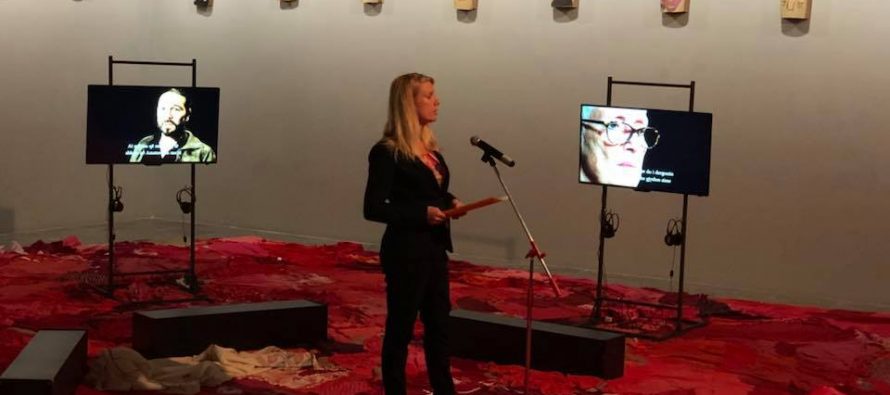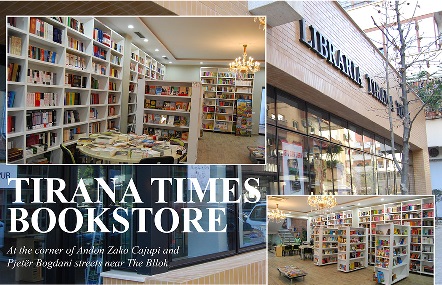‘Handle with Care’ reminds public of persisting human trafficking and stigma

Story Highlights
- An artistic installation was exhibited at the National History Museum in Tirana to raise awareness on the human trafficking issues the world is facing, more specifically to the sexual exploitation of women
Related Articles
TIRANA, Oct. 17- The Embassy of Netherlands together with ‘Tirana Art’ Center and the Embassy of Low Countries organized an activity called Handle with Care, which opened its doors at the National History Museum in Tirana on Oct. 17, and then will move on to other Albanian cities.
Handle With Care, deals with the existence of present day enslavement, a brutal reality for the women who have fallen victim to human trafficking and the sex industry. The installation consists of three works: drawn paper bags hanged on the wall, a carpet of clothes, and shared stories of escaped women who were part of the forced prostitution world.
The carpet of clothes is called Mantle of Love and it’s created by Patricia Kaersenhout. The clothes there, blouses, bras, underwear, dresses, are all attire worn by the enslaved women in Netherlands who managed to escape. They are in the shades of red, which associated worldwide with prostitution and the Red Light district. It symbolizes the oppression of women and the way their rights are constantly trodden underfoot. One could also understand it in the context of sweeping everything we don’t say or don’t want to see under the carpet. There are many layers of meaning and space for interpretation there. Seeing the bras and pieces of attire thrown around the floor gives an implied fearful feeling of women taken and thrown around in the street, like objects to be worn and used.
The Masks painted on paper bags on the surrounding wall are all drawn by women who survived forced prostitution and human trafficking. They are self-portraits of these women, an expression of how they see themselves, hidden by a mask to retain their anonymity.
The videos that share the stories of some of these women are made by Jimini Hignett. The stories are interpreted by local actors, and the identities of those who have shared them are to remain anonymous. These are individual tales of women who have been sold or tricked into the sex trade world in the Netherlands or elsewhere. They reveal backgrounds of societies rife with inequalities, misogyny and abuse. They expose the painful, disturbing reality of racial and class privilege, and a tenacious assumption of male privilege. The tales bear witness go the way the trade and exploitation of women ties in with larger economic and political processes such as economic inequality, privatization and corruption.
Human trafficking is the crime which has the highest increase over the years. 71% of human trafficking victims are females; 51% women and 20% girls, while the rest 29% are male victims. More than 50% of the trafficking victims are sexually exploited, the sex trade and forced prostitution industry generating around $99 billion annually. An estimated 24.9 million people are into forced labour. Millions of children worldwide are either sexually exploited or enslaved into labour.
Visitors are invited to reflect on the women’s oppression and especially the relation with the trafficking into the sex trade. Some of these stories may have been heard before, perhaps not in such crude details, but these very details are what need to be raised an awareness to and stressed upon. Because these details gets the attention of the reality that these people have faced, and makes that reality more attainable. That is a world that we recognize its existence of, however, in the minds of most of us is a world too far away from our reach. Through these stories and such activities we can see that this world it’s only hidden behind a veil right in front of our eyes, and we should be more open to help the survivors integrate into society again, provide psychological and friendly support, and work to keep any potential situations from occurring. These are people whose lives get utterly destroyed from greedy people who have lost the notion of good and evil, or any rational reflection that they are exploiting and abusing human beings. Being aware of this reality can give a positive impact to each of us to help save a life.
This installation will remain open for the public in Tirana at the National History Museum until Oct. 20, and then will be displayed on Oct. 22-23 in Shkoder, Oct. 25-26 in Berat, and finally Oct. 29-30 in Vlore.




